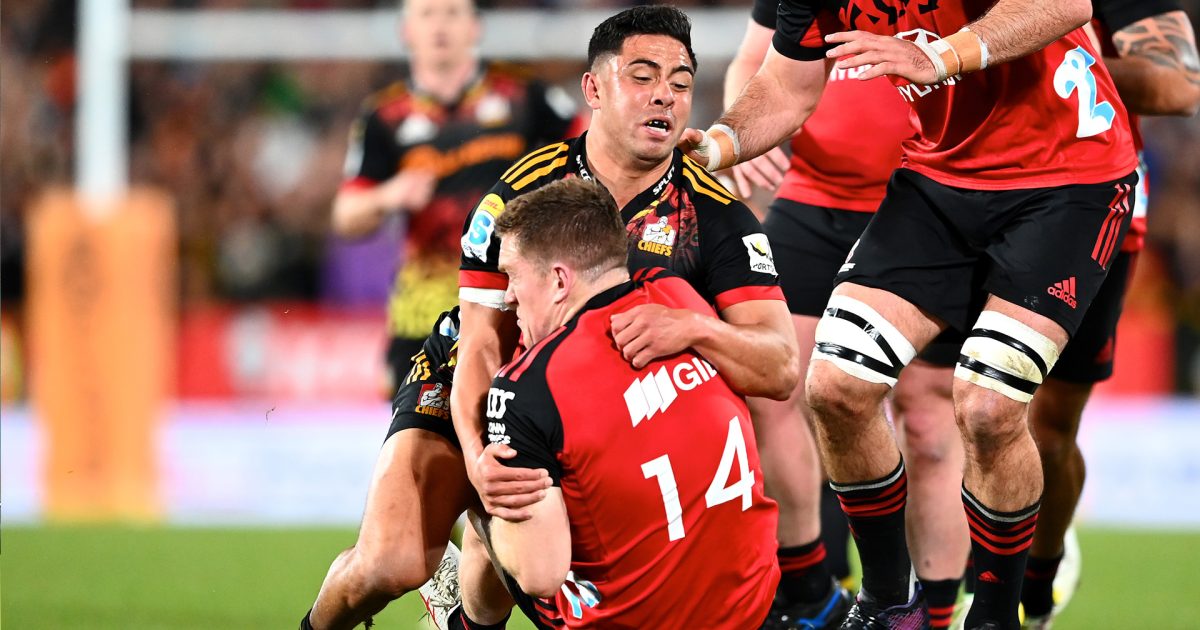Refereeing differences must be ironed out ahead of Rugby World Cup – Andy Goode

The Super Rugby final laid bare how much work there is still to do in terms of the officiating ahead of the Rugby World Cup and there is just a couple of months to put things right.
Anyone can make a mistake, and the decision not to send off Anton Lienert-Brown was a glaring one on the biggest stage in southern hemisphere club rugby, but it seems clear there is a major difference between the hemispheres when it comes to refereeing.
Both Super Rugby final referee Ben O’Keeffe and TMO Brendon Pickerill are going to France as one of the chosen few in those roles and such a blatant error can’t be allowed to happen on the biggest stage of all.
It did feel like there was a desire not to send a player off because it was a final, which cannot be the case, but there is definitely a cultural difference and contrasting attitudes between the northern and southern hemispheres as well.

We have seen other instances throughout this season and going back further where tackles that clearly meet the red card threshold have been allowed to go unpunished or have resulted in a yellow card and World Rugby need to make sure everyone is on the same page.
As is always the case with major tournaments, there will be a host of camps and get togethers for the officials ahead of the 2023 World Cup and a couple of months is enough time to make significant progress but it would have been better if everyone had been singing from the same hymn sheet for the past few years as well.
SANZAAR are responsible for the referees in Super Rugby and, aside from the law differences, they don’t seem from the outside to be taking quite the same approach as governing bodies in European rugby.
The challenge that ended Dallas McLeod’s Super Rugby final has long been a red card offence, it’s as clear as day and we’ve spent a lot of this four-year Rugby World Cup cycle discussing such incidents and trying to do whatever we can to eliminate them from the sport.
In the southern hemisphere too many are still being overlooked and the message isn’t filtering down to the players, or the fans for that matter, so behaviour isn’t maybe changing as fast as we’d all like.

Lienert-Brown’s tackle in the Super Rugby final was a particularly bad example given the way the laws are in that competition at the moment. O’Keeffe did the right thing as the referee by issuing a yellow card and allowing the TMO to make the call but Pickerill didn’t upgrade it to a red, despite having eight minutes to look at it.
It should’ve been a perfect example of the law trial working well but instead it was an obvious error and it just shows that, regardless of the system you have in place, you have to trust the human beings to utilise it correctly under pressure and come to the right decision.
There has been talk of implementing a TMO bunker ahead of the World Cup in September and we’ll have to wait and see exactly what laws and systems are in place for the biggest tournament in the sport but the difference in approach and interpretation between officials in the southern and northern hemispheres has to be addressed.
Frenchman and former top international referee himself Joël Jutge is World Rugby’s High Performance 15s Match Official Manager and he acknowledged the amount of work there is to do when the match official team for the World Cup was selected last month.
“Selection is one milestone, and we have a lot of work to do before the start of the tournament with warm-up matches and The Rugby Championship. But this team has a great work ethic, an unwavering spirit and a great bond and we will all benefit from increased time together as we prepare for what will be a very special Rugby World Cup 2023 in France,” he said.

That period of preparation over the next couple of months is going to be crucial for a host of nations that maybe aren’t quite where they would have liked to be after an entire four-year cycle, England among them, and for some countries welcoming in a number of new players because of the change in eligibility laws.
The lengthy spell together could be something of a leveller and enable teams to make up at least some ground on the teams that have been leading the way over the past few years and it’s going to be just as vital, maybe more so, for the team of match officials.
They still have time and will be given all the resources necessary to get the approach right and get on the same page but there’s going to have to be a shift in mindset in some quarters from what we’ve seen in recent years and the Super Rugby final is sure to be a case study used to demonstrate what not to do.















